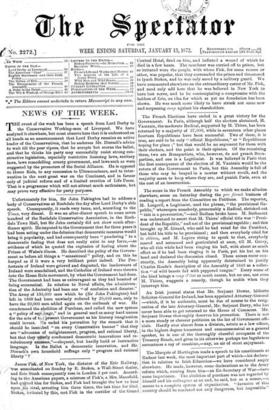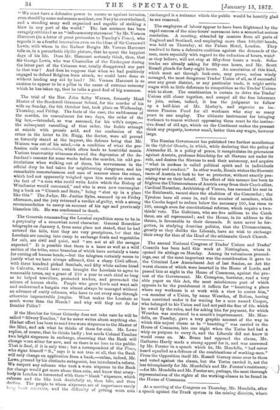The Marquis of Hartington made a speech to his constituents
at Radnor last week, the most important part of which—his declara- tion in relation to Irish Education—we have considered amply elsewhere. He made, however, some declarations as to the Army reform which, coming from him—an Ex-Secretary of War—have some importance. The abolition of purchase was not regarded by himself and his colleagues as an end, he said, but as a means,—a means to a complete system of organization. "Invasion of this country should be rendered not only dangerous, but impossible." " We must have a defensive power to secure us against invasion, even should by some unforeseen accident, our Navy be overwhelmed, and a standing army well organized and capable of striking a blow in any part of the world." The last sentence has been savagelycriticized as an "inflanimatorystatement " by Mr. Vernon Harcourt (in a letter of great pretension to Tuesday's Times), who regards it as a fearful innovation even on the ideas of Sir Cornewall Lewis, with whom in the Radnor Burghs Mr. Vernon Harcourt tells us, in a parenthetic idyllic picture, that he spent the happiest days of his life. Does Mr. Harcourt seriously think, then, that Sir George Lewis, who was Chancellor of the Exchequer during the latter part of the Crimean war, totally disapproved our part in that war? And does he suppose that when we had positively engaged to defend Belgium from attack, we could have done so without lending any aid by land? Mr. Vernon Harcourt is so anxious to appear to be a pillar in the cause of extreme economy which he has taken up, that he talks a good deal of big nonsense.



































